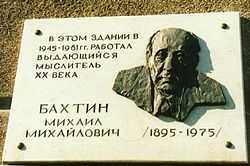Bakhtin
“Truth is not born nor is it to be found inside the head of an individual person, it is born between people collectively searching for truth, in the process of their dialogic interaction” [1]
(click here for full wikipedia entry on Mikhail Bakhtin)

Mikhail Mikhailovich Bakhtin (November 17, 1895 – March 7, 1975 was a Russian philosopher, literary critic,semiotician and scholar who wrote influential works of literary and rhetorical theory and criticism. His works, dealing with a variety of subjects, have inspired groups of thinkers such as neo-Marxists, structuralists, and semioticians, who have all incorporated Bakhtinian ideas into theories of their own. Among the circle of Russian/Soviet writers who made important contributions to aesthetic analysis during the first third of the 20th Century (including Yury Tynyanov and Boris Eikhenbaum), Bakhtin has been the main contributor; he was among the leaders of the Formalism circle in Leningrad who helped develop a new "materialistic" view of Russian literature. After some time out of favour, his work has recently become fashionable once more.
Key Ideas
The Utterance
For Bakhtin the basic unit of language was the utterance, defined as the continual speech of one voice. The structuralist tendancy to reduce language to the basic unit of the word ignores the dialogic nature of the speech act.
Heteroglossia
Heteroglossia literally means many-voice-ness.
Bakhtin on the Internet
- The Bakhtin Circle, Internet Encyclopedia of Philosophy
- The Bakhtin Centre (University of Sheffield)
- A Bakhtin profile (James P. Zappen)
- Another Bakhtin profile (Vincent Hevern)
- Bakhtin Timeline
- "INTERNATIONAL MAN OF MYSTERY - The Battle over Mikhail Bakhtin" By Matt Steinglass, in Lingua Franca, (April 1998).
- Philology in Runet. A special search through the M. M. Bakhtin's works.
- Carnival, Carnivalesque and the Grotesque Body
- A SURVEY OF THE IDEAS OF BAKHTIN
- Bakhtin and Religion: A Feeling for Faith
- excerpts from Rabelais and his world
- Page on Bakhtin with a photo
References
- ↑ Bakhtin, M.M. (1984) Problems of Dostoevsky’s Poetics. Edited and trans. by Caryl Emerson. Minnieapolis: University of Michigan Press.
(Back to Introduction to Anthropology